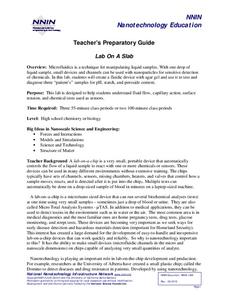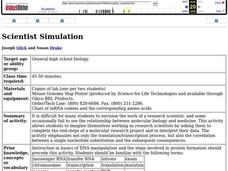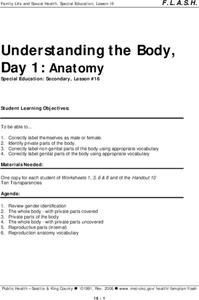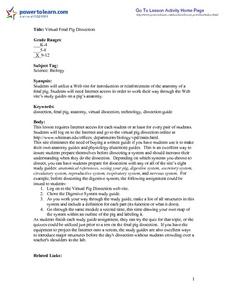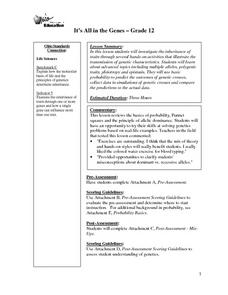Cornell University
The Making of Macromolecules
Compare and contrast macromolecules made from the same elements. Young scholars learn how the structure of a molecule has as much influence on a compound as the elements in the molecule. They experiment with molecular model kits to...
Kenan Fellows
Applying Linear Regression to Marathon Data
It's not a sprint, it's a marathon! Statistic concepts take time to develop and understand. A guided activity provides an opportunity for individuals to practice their linear regression techniques in spreadsheet software. The activity...
Teach Engineering
Tissue Mechanics
Engage your class by showing them how silly putty and human tissues are alike. Pupils learn more about tissue mechanics by reflecting upon their experiences with silly putty. The lesson covers collagen, elastin, and proteoglycans and...
Teach Engineering
The Grand Challenge: Fix the Hip Challenge
It may be time to get to know the skeletons in your family. The first lesson in a series of 5, introduces the class to the concept of osteoporosis. The class members brainstorm possible causes and whether the family should be concerned...
Florida International University
Design Your Own
Apply scientific principles to designing an experiment to study organisms living on the coral reef in our oceans. Through reading, individuals learn about the coral reef ecosystem and important factors that affect its function. Using the...
Nuffield Foundation
Interpreting an Investigation of Plant Hormones
How important is the tip of a new shoot on a growing plant? Individuals learn about the results of experiments on shoot tips and must interpret them. They apply previous learning and connect complex ideas through advanced analysis.
Nuffield Foundation
Microscale Investigations of Catalase Activity in Plant Extracts
Use indirect measurements to monitor metabolic activity in plant cells. Scholars understand that cells with a higher metabolic rate have a higher concentration of catalase enzyme. They use this information to compare metabolic rates of...
National Nanotechnology Infrastructure Network
Lab On A Slab
Capillary action is the frugal chemist's dream ... the less liquid used, the more tests they can run! Learners experiment with the best design to maximize the benefits of capillary action. Using a liquid sample, they design a capillary...
Serendip
Evolution and Adaptations
Survival of the fittest isn't just for the movies! A five-part lesson explores several different species with known adaptations and analyzes them for their survival strategies. Using both video and research data, scholars draw...
Serendip
DNA
Get up close and personal with DNA! A two-part hands-on activity has learners extract DNA from a small organism and then their own cheek cells. Scholars then explore DNA replication using questions to guide their analyses.
Curated OER
How Is the Genetic Code Ultimately Translated Into a Protein?
Young scholars examine the functions of mRNA, rRNA and tRNA. They explain the steps in the protein synthesis process. They practice using new vocabulary as well.
Curated OER
Respiration Crossword
For this respiration worksheet, students complete a crossword puzzle by figuring out the vocabulary words associated with the 14 clues given.
Curated OER
Using a Questionnaire as a Tool for Management
Students survey other students, teachers, and administrators, using a provided questionnaire, to see what environmental problems the school may have. Students then compile the results, post the results, and decide what the biggest...
Curated OER
Living in Extreme Environments: Havens on the Deep Sea Floor
Students identify the characteristics of an extreme environment in the deep ocean and consider what organisms need to survive in these elements. They research sampling and data collection methods in this environment.
Curated OER
Biochemistry Detectives
High schoolers explore the process of chemosynthesis and relate it to the biological communities in cold seeps. In this biochemistry lesson plan students interpret analyses of enzyme activity and draw inferences about organisms in cold...
Curated OER
The Heart
Students identify the parts of the heart and the path blood flows through it. They practice using new vocabulary and labeling the parts of the heart. They examine the path of oxygenated and deoxygenated blood as well.
Curated OER
Scientist Simulation
Students envision the work of a research scientist, and the relationship between molecular biology and medicine. This activity allows students to imagine themselves working as research scientists by asking them to complete the end-steps...
Curated OER
Understanding the Body, Day 1: Anatomy
Students review gender identification and label themselves female or male. They identify the parts of the human body and practice using appropriate vocabulary. They complete a worksheet to complete the instructional activity.
Curated OER
Virtual Fetal Pig Dissection
Students use the internet to introduce themselves to the anatomy of a fetal pig. In pairs or individually, they work their way through a virtual dissection of a fetal pig while completing questions on a study guide. They also develop...
Curated OER
Genetically Modified Foods
High schoolers explain what genetically modified foods are and how they are created. Students use appropriate vocabulary to describe and effectively discuss the benefits of, and potential risks of, genetically modified foods.
Curated OER
Antigen Switching in Malaria
Learners model how the malaria-causing protist avoids immune response in its host. In this parasite biology lesson, students use printed cell images to model the way that Plasmodium changes surface protein markers every few generations...
Curated OER
Understanding Interactions Among Local Species and the Local Environment
Students examine the differences between biotic and abiotic factors, explain the difference between habitat and niche and compare how organisms get their nutritional needs. In this local environment lesson students trace the path of...
Curated OER
It's All in the Genes
Twelfth graders investigate the inheritance of traits through several hands-on activities that illustrate the transmission of genetic characteristics. Students study advanced topics including multiple alleles, polygenic traits,...
Curated OER
Biodiversity
Students match certain animals with a possible fate that could happen to them from a provided list in order to discover the threats to biodiversity and the role humans play. They also discover the importance of biodiversity and what we...
Other popular searches
- Plant Biology Vocabulary
- Biology Vocabulary Words
- Ap Biology Vocabulary
- Biology Vocabulary Genetics
- Biology Vocabulary Review
- Biology Vocabulary Lessons
- Biology Vocabulary 98
- Biology Vocabulary Prefixes
- Biology Vocabulary Bacteria
- Biology Vocabularyv 98









